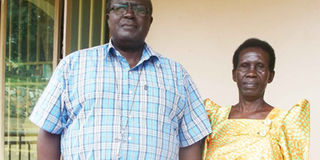Farming keeps Bishop Matovu busy

Most people have to continue working hard even after retirement to feed their families. Photo by Jessica Sabano
What you need to know:
Important. He is now a prominent farmer of cross-breed cattle, crops and fish in Nasuti village and planting crops such maize and beans in Ntejeru Sub-county, Mukono District maize. He earns about Shs20m annually from mixed farming, writes Jessica Sebano
To Bishop Jackson Matovu, retirement is something he knew would come at one time in his life.
In trying to avoid some of the challenges faced by people who go into retirement, he endeavoured to plan for the years when he was no longer able to work.
He says he got a place to build for his old age in 1989, when he was just a secretary at church.
Today he does not regret serving God and this has helped him to live a comforting life ever since he retired in 2017. “Serving as a Bishop at Church of Uganda was interesting as I was preaching the word of God. Actually I started serving God when I was still a youth as I would participate in different church activities. I remember one time my parents had no school fees and I fully participated in church activities as I would drum and take letters to different people. And I have no regret for doing church work because I am living a comforting and fulfilling life in retirement,” Matovu says.
Retirement is one of the most trending topics of discussion, most especially amongst people half way their life or even those in the evening of their lives. Most have a view that for one to have a comfortable and fulfilling retirement, they have to plan extremely well right from the time they start working.
This kind of view is with time being passed from generation to generation. Bishop Matovu who dedicated his entire life to serving God, holds the same view.
“For you to have a good time during retirement, you must have planned and prepared yourself to the best. I prepared myself psychologically and physically well,” he said.
Planning for retirement
“This is in our constitution in church, especially when you become a clergy, you have to plan. Since I had got my piece of land in Nasuti village which is not far from my church, I started thinking of projects,” the cleric said.
He started planning for life after retirement before being appointed bishop in 2000.
Some of the things he focused on are to have a good home, having projects such as farming and ministry work.
“Some people may say that it was too early for me to start thinking about retirement since I had just been posted at the dioceses. However I knew that my time for retirement would come and I had to strategise on how I would spend my time during retirement. One of the things that I looked at that time was farming and ministering in other Christian activities such as training people into priesthood and marrying off couples,” he said.
Transition into retirement
Much as people usually find a hard time to cope with life after work, Bishop Matovu had an easier transition. He says his life was more of the same even after retiring.
This is because he had planned on how he could easily keep himself engage and avoid being idle.
“I am always having good meals, doing exercises to keep me strong and healthy,” he says. He says he did not find any difficulty in coping with retirement just like his working days, he still receives the same calls as he used to get. This is because he has engaged in a number of things in his retirement such as involving in different ministries.
Early life
Bishop Matovu was born on January 29, 1952. He was raised in a family of Eric Muwonge and Majeri Nambi in Bunyama village, Musale parish, Nterujeru Sub-county Mukono District. His mother was a leader in church and father was farmer. He is the second born of 11 children in the family. His father was a peasant farmer who wanted Matovu to become a priest.
Matovu attended Bugolombe, Mugomba and Nsanji primary schools before joining Kojja SSS (1967-1971) for secondary school.
He dropped out of school in 1971 after failing to raise school fees. The same year his parents advised him to get married and go to church to serve God.
He married Perus Nabweteme and in 1972 he went for a course in religious education at Mpumu. From Mpumu, Bishop Matovu was dispatched to St Philips and Andrews Cathedral in Mukono as archdeacon. A year later he was ordained deacon and transferred to Buzziwera Parish Luwero Dioceses. He later went to Bishop Tucker Theological College in Mukono to study theology where he was ordained priest in 1978.



